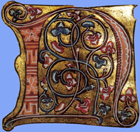England
Bro Saoz


Cheshire
Bro Gaer
| Noms de lieux | Noms de personnes |
|
England Bro Saoz |
|
Cheshire Bro Gaer |
 orthwich orthwich |
Condate
| page ouverte le 22.07.2004 | forum de discussion
* forum du site Marikavel : Academia Celtica |
dernière mise à jour : 06/04/2009 13:50:26 |
![]()
|
Définition : ville d'Angleterre, dans le comté de Cheshire. Ancien fort romain CONDATE, au confluent des rivières Dane et Weaver. |
|
![]()
|
Extrait de la carte Ordnance Survey : Map of Roman Britain. |
![]()
|
Histoire |
![]()
| Étymologie
:
* Rivet & Smith, Place-Names of Roman Britain : - Itinéraire d'Antonin 4691 (Iter II) et 4823 (Iter X) : CONDATE. - Ravenna, 10647 : CONDATE. DERIVATION. Although Dauzat TF 42 thinks that the name 'ne s'explique pas par le celtique' and that it must have been borrowed into Gaulish from another language, Williams and Jackson (Britannia, I (1970), 71) agree on Celtic roots. The name is British *Condatis or neuter *Condati, from *com 'with', da- a reduced grade of either Indo-European *do- ' give ' or *dhe- 'put', and verbal-adjectival suffix *-ti(s); the whole having the sense of'confluence'. Pokorny 175 prefers to relate the second element to the root *da- found in *danu- 'river' (as in British Danum, etc.). In Latin the name is indeclinable and always appears as above. The distribution of the name is curious. It is found in many parts of Gaul, once in Britain, once in Wurtemburg (Vincent 238-41), but is unknown in Spain and N. Italy. Williams notes that in Wales and Brittany it was ousted (in expressing thenotion of 'confluence') by Cymer, Quimper, etc., from *com-bher (see Combretovium). In Iberia the idea was expressed by *com-plut- ' flowing together', as in Complutum now Alcala de Henares (Madrid, Spain) and Complutica > Compludo (Léon, Spain). Such names as Komfloeta (= Comfluenta) in Ptolemy II, 6, 54 may be translations of older Celtic names of the *com-plut- type, as also happened at Lyon (France), where the Gaulish settlement at the junction of the Rhône and Saône was Condate but later *Confluens, Ad Confluentem. In Gaul Condate evolved differently depending on whether it was stressed in the Gaulish way, Condate > Condes, or in the Latin fashion, Condate > Condat, Condé, etc. We have no means of knowing how the solitary British name was stressed. Condatis was also a god 'of the waters-meet', associated with Mars. Altars to him are known at Bowes (RIB 731), Piercebridge (1024) and Chester-le-Street (1045). IDENTIFICATION. The Roman settlement at Northwich, Cheshire (SJ 6673), at the confluence of the rivers Dane and Weaver. ************** Observation JC Even : - à propos du dernier paragraphe, faisant intervenir le dieu Mars. Celui-ci est également associé au dieu gaulois Borvos, ce dernier désignant : le Bouillonnant. En ce sens, on peut l'expliquer par le bouillonnement des eaux de confluences, et l'approcher d'un sens *phr°- > bwr°-, ayant pour sens général : eau bouillonnante / tourbillonnante. ***** |
![]()
|
Sources : * Eilert EKWALL : Dictionary of English Place-Names. Oxford * ALF RIVET & Colin SMITH : The Place-Names of Roman Britain. Batsford Ltd. London. 1979-1982. - envoi de ** |
![]()
|
* lien communal officiel : * forum du site Marikavel : Academia-celtica hast buan, ma mignonig go fast, my little friend |
![]()